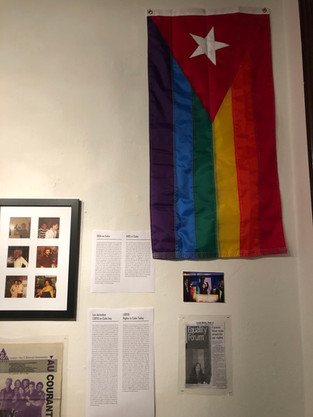Not country for "locas"
- Lázaro González

- Dec 14, 2020
- 3 min read
Updated: Jan 1, 2021

If my memory is not failing, the first time I saw his " passport" was during the same late autumn in which we reviewed hundreds of pictures of Eloy's first years in the United States, while Olga Guillot (one of the most recognized voices of the Cuban exile) was singing boleros without stop. That piece of paper, very hard to read, was the only material evidence of someone’s life change.
This strange passport did not reflect what happened in early May 1980 when a policeman arrived at Eloy's house with the order that he should leave the country. At that time, nobody cared about his desires. Eloy had 29 years old in that moment and he never thought in emigrating. In Cuba, although it seems strange, he was happy because he escaped from the familiar homophobia; he got a good job, many friends, and a home of his own; although he knew that this was not a country for “locas”.
Despite everything, he ran with enough luck until that day in May. He had not been arrested before, or never suffered the UMAP or gay’s raids, in contrast with many of his friends who were usually caught by the cops around Coppelia’ ice cream store; or in any other corner where their feathers called much the attention. His first contact with the forces of the order was that day in which he got the police citation. He came back from the beach and discovered that thousands of people had requested asylum in the Embassy of Peru, starting one of the biggest migratory crisis of the country. And, surprisingly for him, the visit of the cops was related to the the uprising refugee crisis. In other words, they were trying to include Eloy in the same group of people who were seeking for asylum.
That explains his astonishment when the police said, "Look, all the homosexuals can go to different offices. There you make your papers and in less than 24 hours you will be able to go in one hast boat to Miami. "Otherwise, you might go to prison" said the official, minutes before his friend Manuel (Manolo) Sayoux ⎯ the couturier of the famous singer Farah María ⎯ will confirm by telephone that he had just received the same warning.
Manolo and he went together to an office in Havana’s neighborhood called Víbora and when they arrived there, Eloy corroborated that it was time to go. "No, I have to think about it, " he told them. But it was pointless because the officer just filled some papers without even asking.
A day after, a motorbike police officer shouted his name with a speaker. " That was intended to incite people to yell at me. Luckily, on my block they loved me a lot, they saw me as a decent black boy. Only one child shouted something, sent by his father”, he recalls.
In less than 48 hours, that young man who had gone to Minas de Frío to educate himself as a teacher, ended up being swept away by the tide of national machismo. There was no criminal background, or any document to incriminate him, regardless of the incongruity with the model of the "new man" who sought to build the society socialist.
It all happened so fast that, 40 years later, Eloy still wonders how he was picked to be one of those 20,000 gays, forced to leave their country in the spring of 1980.










































Comments